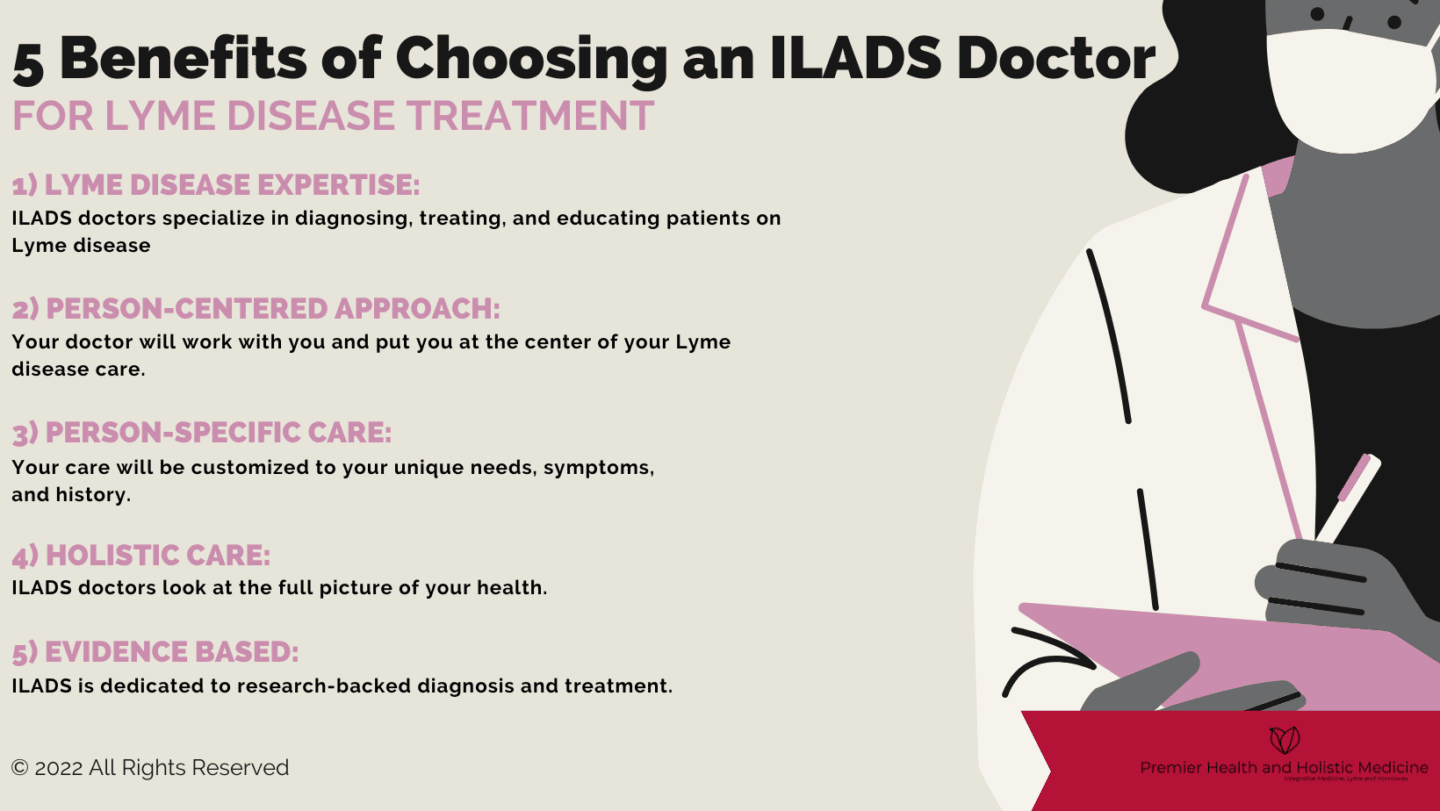Lyme disease is an extremely complex condition, so it may not be surprising that there are different perspectives on diagnosis and treatment. An ILADS doctor belongs to an organization called the International Lyme and Associated Diseases Society. This nonprofit medical society’s aim is to provide evidence-based care for people with tick-borne illnesses. In this blog, you can learn what makes the ILADS approach special and how to choose an ILADS doctor.
Are you concerned you might have Lyme disease? Contact us at Premier Health and Holistic Medicine.
ILADS and Diagnosis
ILADS doctors have their own approach to diagnosing Lyme disease. It is evidence-based, thorough, and holistic. As ILADS doctors, they look beyond the obvious to find the root cause of your symptoms.
The standard diagnostic method for identifying Lyme disease is to order tests. Through tests like the ELISA test or the Western blot test, doctors sometimes decide that a patient has Lyme disease. If the patient also has the bullseye-shaped rash that often occurs with Lyme disease, then the diagnosis is considered confirmed.
However, these tests are not well-proven, often leading to false positives or false negatives. Such tests can be useful as a starting point, though. In fact, ILADS doctors often use them. Yet, the ILADS approach to diagnosis goes far beyond this. Even when the Elisa test is followed by the Western blot test and neither shows no sign of Lyme disease, you could still have Lyme disease due to the unreliability of the tests.
That is why ILADS doctors don’t diagnose on the test results alone. They want to consider your full story, including your medical history, current health, and any chronic conditions they might have. Because Lyme disease can lead to other diseases, such as Lyme arthritis, it’s important for the doctor to know as much as possible about the patient, their life, and their health.
ILADS Treatments
There has been some controversy over how to treat Lyme disease. Since Lyme disease is such a complex disease that can affect people of any age or physical condition, it must be treated according to what is best for each individual. Antibiotics are usually a part of the treatment plan, and some people need to be on antibiotics for longer than others, especially if they have had untreated Lyme disease for a significant period of time. Whether you recover quickly and easily or have a harder time could depend on several factors, including.
- the specific type of tick
- the length of time from the bite to the treatment
- what parts of your body have been affected
- whether you have other similar diseases and your general health conditions
- whether you have other tick-borne diseases
Although doctors of all kinds have been somewhat familiar with Lyme disease, it was ILADS members who devised the only evidence-based guidelines for Lyme disease treatment. ILADS doctors, following these guidelines, can provide several types of treatment, such as:
- Give antibiotics in advance of any illness based on the fact that you’ve been bitten by a tick.
- Give the antibiotics for 20 days
- Continue the antibiotic for 4-6 weeks if the person has the bullseye rash – formally called erythema migrans.
- Provide personalized treatment if you have chronic symptoms of Lyme disease.
The answer to what is an ILADS doctor becomes clearer when the disease lingers and causes chronic problems. Because an ILADS doctor looks at you as a whole person, they provide care that addresses all your symptoms, whether temporary or ongoing.
ILADS Doctors Treat Chronic Lyme Disease
At first, most doctors recognized Lyme disease as a chronic disease. Very shortly, though, some medical associations began to call Lyme disease only an acute infection. The CDC takes the perspective that Lyme disease is acute unless it lasts longer than six months after the antibiotics are given. In that case, it calls the problem Post-Treatment Lyme Disease Syndrome.
ILADS doctors, on the other hand, recognize that there are people who have a chronic form of Lyme disease, as well as other people who only have a short-lived acute infection. If you have chronic Lyme disease, you might have any of the following symptoms.
- Fatigue
- Headaches
- Numbness and tingling
- Depression and anxiety
- Sleep problems
- Cognitive dysfunction
- Neuropathic pain
- Musculoskeletal problems
Many of the symptoms of Lyme disease also appear in other illnesses. For example, you might have flu-like symptoms with chronic Lyme disease. The truth is that you could have chronic Lyme disease and never think of attributing it to a tick bite. In fact, you might not even remember the bite. That’s why a careful, thorough, and intelligent look at all your symptoms is needed, along with medical testing.
ILADS doctors, unlike other doctors, recognize and treat chronic Lyme disease. The ILADS physicians take the stance that the problems associated with chronic Lyme disease are damaging enough that long-term antibiotics treatment is sometimes necessary, though it comes with risks. An ILADS member doctor will likely follow the protocols set by ILADS. These guidelines are also designed to help people who often get marginalized by the medical community. In other words, if you have a chronic disease that affects your quality of life, the ILADS organization aims to help.
Benefits of Choosing an ILADS Doctor

If you have or think you might have Lyme disease, choosing an ILADS doctor is the best way to get the care you need. There are several benefits of going to an ILADS doctor. Here are just a few of them.
Expertise
When you have an ILADS doctor, you can expect an expert in diagnosing, treating, and educating their patients on vector-borne diseases. This commitment to patient education is a goal of ILADEF, the ILADS’ education organization. While other doctors may have some training and experience with Lyme disease, it is not their primary focus. So, they are less likely to recognize the subtler symptoms or acknowledge chronic Lyme disease.
Person-Centered Approach
Doctors who are members of ILADS take a person-centered approach. What that means to you is that your ILADS doctor puts you and your well-being first. Rather than putting themselves at the center of treatment, these doctors listen to you and make choices based on what will help you the most.
Person-Specific Care
The ILADS organization supports person-centered care. This type of approach means your ILADS doctor evaluates you as an individual with your own blend of symptoms, history, and general health. They then create a treatment plan that is custom-tailored to help you as a whole person.
Looking at the Full Picture
There’s another way that an ILADS doctor can help you. They don’t give you a quick test and send you on your way. Although they do use tests, those results are only a part of their assessment. In addition, they assess the full picture of your health. Then, as treatment progresses, they continue to assess your current symptoms at that time and watch for other health problems.
ILADS and Research
ILADS is also involved in research on Lyme disease and its diagnosis and treatment. Since so few studies have been done relative to the extent of the disease, ILADS supports and contributes to finding out more about through Lyme disease research.
Where Can You Find an ILADS Doctor in Virginia?
Dr. Robin Ridinger is an ILADS doctor based in Leesburg, Virginia, practicing at Premier Health and Holistic Medicine. Her integrative medicine approach helps many patients who have not found healing elsewhere.
Dr. Ridinger is not only a double-board certified in Integrative Holistic Medicine and Family Medicine. She is also affiliated with ILADS. With Dr. Ridinger’s expertise and over 25 years of experience, you can feel assured that she will offer the right treatments for you as a unique individual.
Have you been searching for a doctor who can treat chronic Lyme disease and more? Contact us at Premier Health and Holistic Medicine.


